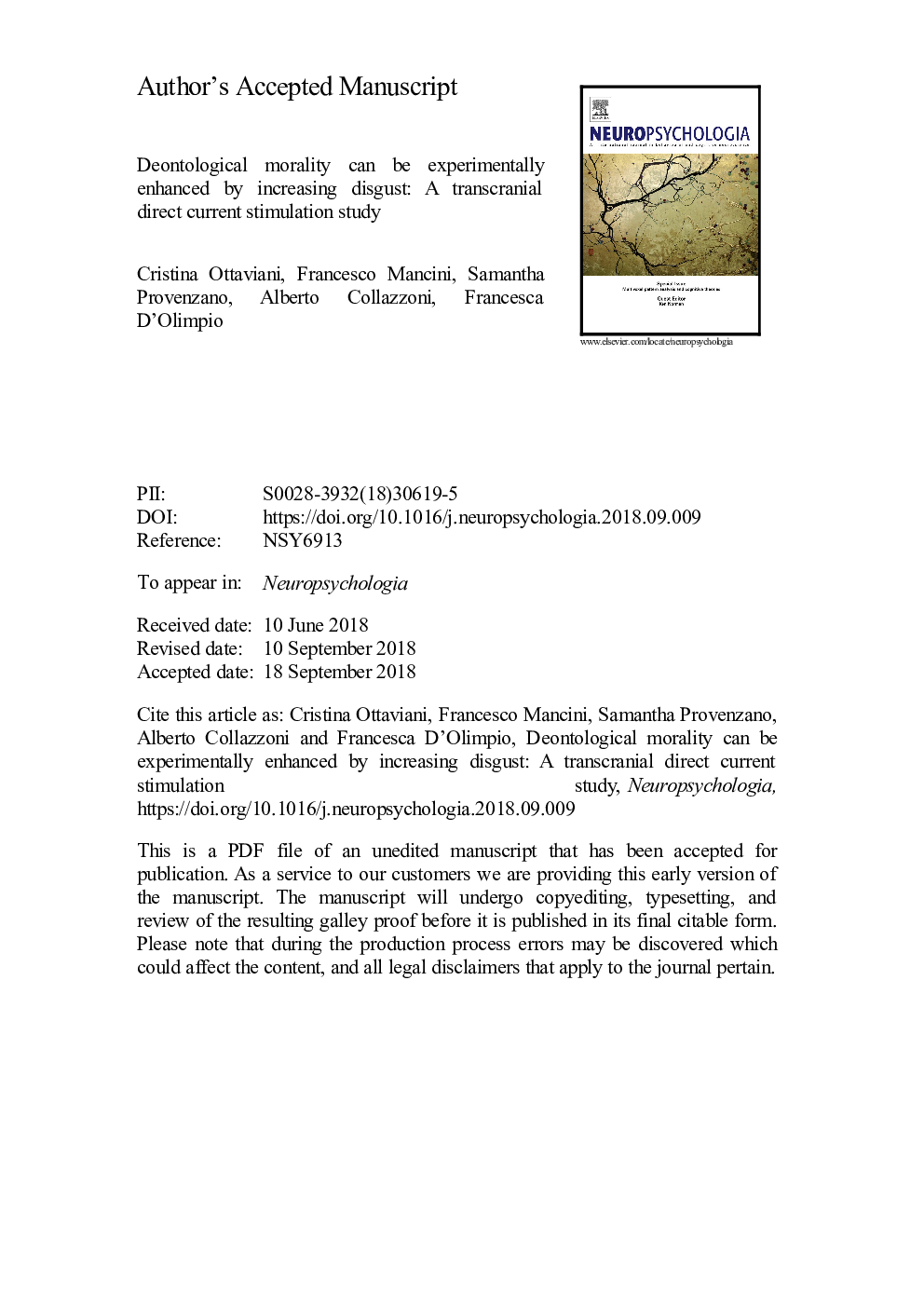| کد مقاله | کد نشریه | سال انتشار | مقاله انگلیسی | نسخه تمام متن |
|---|---|---|---|---|
| 11004698 | 1475537 | 2018 | 31 صفحه PDF | دانلود رایگان |
عنوان انگلیسی مقاله ISI
Deontological morality can be experimentally enhanced by increasing disgust: A transcranial direct current stimulation study
ترجمه فارسی عنوان
اخلاق روانشناختی را می توان با افزایش انزجار به صورت آزمایشی افزایش داد: مطالعات تحریک جریان مستقیم ترانس کرانانی
دانلود مقاله + سفارش ترجمه
دانلود مقاله ISI انگلیسی
رایگان برای ایرانیان
کلمات کلیدی
تحریک مستقیم مغز جمجمه، اختلال وسواسی-اجباری، تنش قلبی، نفرت، انسولا، اخلاق،
موضوعات مرتبط
علوم زیستی و بیوفناوری
علم عصب شناسی
علوم اعصاب رفتاری
چکیده انگلیسی
Previous studies empirically support the existence of a distinctive association between deontological (but not altruistic) guilt and both disgust and obsessive-compulsive (OC) symptoms. Given that the neural substrate underlying deontological guilt comprises brain regions strictly implicated in the emotion of disgust (i.e. the insula), the present study aimed to test the hypothesis that indirect stimulation of the insula via transcranial direct current stimulation (tDCS) would enhance disgust and morality in the deontological domain. A randomized, sham-controlled, within-subject design was used. Thirty-seven healthy individuals (25 women) underwent 15-min anodal and sham tDCS over T3 in two different days, while their heart rate (HR) was recorded to derive measures of parasympathetic nervous system activity (HR variability; HRV). After the first 10-min of sham or active tDCS stimulation, participants were asked to 1) complete a series of 6-item words that could be completed with either a disgust-related word (cleaning/dirtiness) or neutral alternatives; 2) rate how much a series of vignettes, each depicting a behavior that violated a specific moral foundation, were morally wrong. Levels of trait anxiety, depression, disgust sensitivity, scrupulosity, and altruism as well as pre- and post- stimulation momentary emotional states were assessed. Compared to the sham condition, after active stimulation of T3 a) HRV significantly increased and participants b) completed more words in terms of cleaning/dirtiness and c) reported greater subjective levels of disgust, all suggesting the elicitation of the emotion of disgust. Although the results are only marginally significant, they point to the absence of difference between the two experimental conditions for moral vignettes in the altruistic domain (i.e., animal care, emotional and physical human care), but not in the deontological domain (i.e., authority, fairness, liberty, and sacrality), where vignettes were judged as more morally wrong in the active compared to the sham condition. Moreover, scores on the OCI-R correlated with how much vignettes were evaluated as morally wrong in the deontological domain only. Results preliminarily support the association between disgust and morality in the deontological domain, with important implications for OC disorder (OCD). Future studies should explore the possibility of decreasing both disgust and morality in patients with OCD by the use of non-invasive brain stimulation techniques.
ناشر
Database: Elsevier - ScienceDirect (ساینس دایرکت)
Journal: Neuropsychologia - Volume 119, October 2018, Pages 474-481
Journal: Neuropsychologia - Volume 119, October 2018, Pages 474-481
نویسندگان
Cristina Ottaviani, Francesco Mancini, Samantha Provenzano, Alberto Collazzoni, Francesca D'Olimpio,
